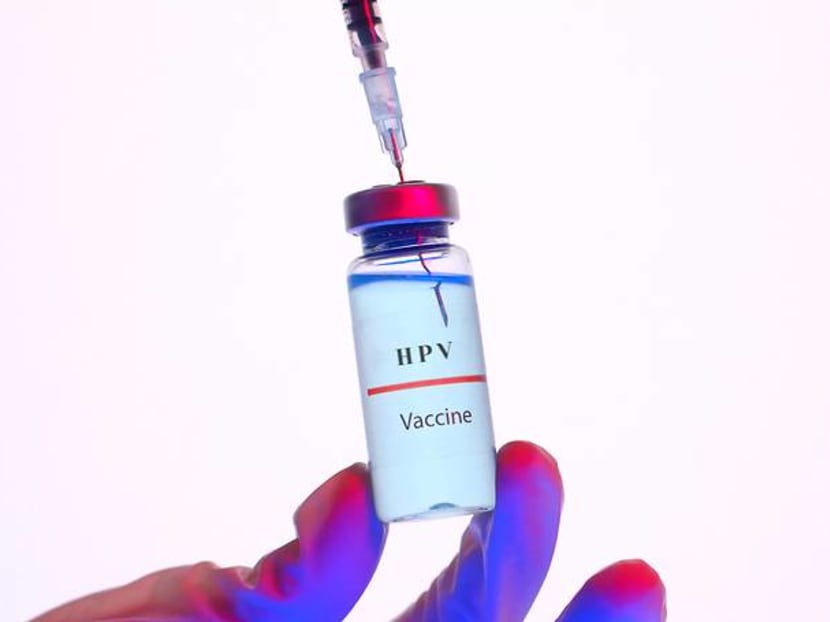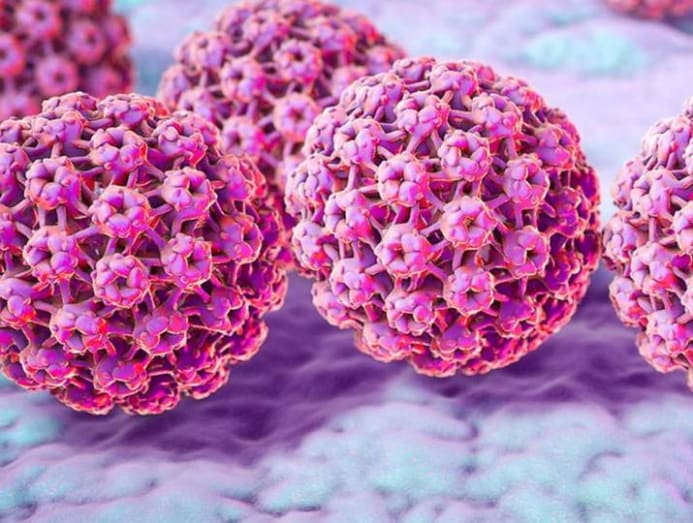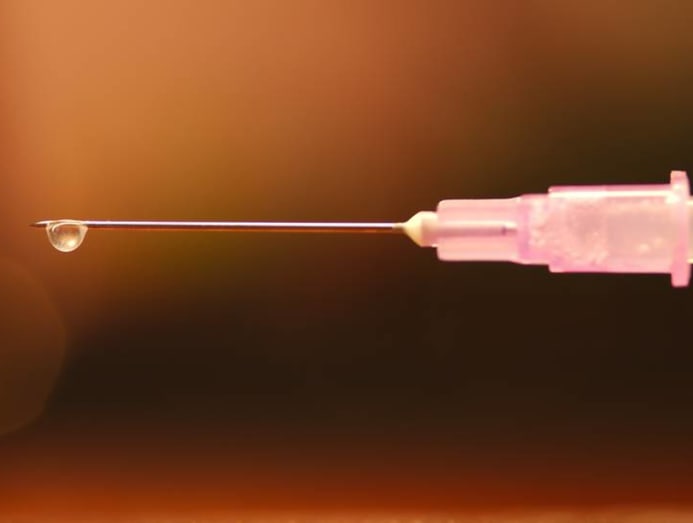There's another vaccine you should be getting – against cervical and penile cancer
The focus these days is on COVID-19, but at some point, sexually active women and men should also think about getting protection from HPV. CNA Lifestyle asks doctors why.

(Photo: Pexels/Artem Podrez)
When people think of vaccines these days, it’s admittedly – and understandably – got to do with COVID-19. But that doesn’t mean we shouldn’t be aware of other vaccines dealing with other important aspects of our health.
One of these has to do with the human papillomavirus or HPV, a sexually transmitted virus that could – through persistent infection over time – lead to cervical cancer in women, penile cancer in men as well as anal cancer in both genders.

The vaccines for HPV aren’t a new thing. Three of these – Cervarix, Gardasil and Gardasil 9 – are already available in Singapore. In fact, if you are a parent of a teenage daughter, you would be aware of Cervarix being offered to Secondary 1 and 2 female students for free under the National School-based HPV programme.
And up until 2020, these vaccines were approved for use from ages nine to 26 (up to age 25 for Cervarix). But last September, the Health Sciences Authority approved for Gardasil 9 to be used by both men and women from ages 27 to 45. This means that it is now allowed to cover both men and women from ages nine to 45.
But, you might be thinking, what’s the point of considering getting the HPV vaccine at an age when you’re already sexually active? Wouldn’t you be exposed to the HPV already?
There is some truth to that. “It is estimated that 80 per cent of sexually active men and women can get HPV infections in their lifetime,” said Dr Chris Chong, an obstetrician, gynaecologist and urogynaecologist at Gleneagles Hospital's Chris Chong Women and Urogynae Centre.
However, individuals can still derive some benefit from the HPV vaccine, even when they are already sexually active. This is because there are over 200 subtypes or strains of the HPV, according to the National University Cancer Institute Singapore (NCIS) website, but only a small handful are regarded as “high risk”. There is a chance you might not have been exposed to these strains.
Cervical cancer is the second leading cause of cancer deaths in women 15 to 44 years old in Singapore.
For women, it is also worth considering because cervical cancer is a silent killer. “Women with cervical pre-cancers are usually asymptomatic until the development of cervical cancer, where one can present with symptoms such as bleeding after sexual intercourse, bleeding after menopause and abnormal vaginal discharge,” said Dr Lim Li Min, an associate consultant with the Division of Gynaecologic Oncology at the NCIS and National University Hospital.
WHY SHOULD OLDER ADULTS GET THE VACCINE, TOO?
HPV infection is apparently very common, almost like the common cold, according to the NCIS website. Fortunately, cervical cancer develops only in a very small percentage of the total number of HPV infections; the majority of our immune systems are able to clear the infections effectively.
READ: HPV can cause cancers in both genders – so should boys be vaccinated too?
But here’s the thing: “People in their 40s to 50s are not as healthy or have as high a resistance compared to those in their 20s,” said Dr Chong. Furthermore, “they are definitely more sexually active compared to people in their 70s. Therefore, the chances of them getting an HPV infection are higher.”And the statistics support that, too. Cervical cancer is the fifth-most common cancer killing women in their 30s, and sixth-most common in the 40s age group, according to the latest 2018 report from the Singapore Cancer Registry.
“Cervical cancer is the second leading cause of cancer deaths in women 15 to 44 years old in Singapore,” said Dr Chong, citing the 2019 Human Papillomavirus And Related Diseases Report by the HPV Information Centre.
Moreover, there is no effective way to know whose immune system can effectively clear high-risk HPV and which can't, noted the NCIS website.
WHAT KIND OF PROTECTION DO THE VACCINES OFFER?
Each of the vaccines protects against a few HPV subtypes – namely the two most common high-risk ones, 16 and 18. According to Healthhub.com, they are responsible for about 70 per cent of cervical cancer cases.
READ: Is heavy menstrual bleeding normal? And what does eating pineapple have to do with it?
For instance, Cervarix protects against the aforementioned HPV subtypes 16 and 18; Gardasil against four subtypes, including 16 and 18; and Gardasil 9 guards against nine subtypes, including 16, 18, 52 and 58 – the last two being the third- and fifth-most prevalent strains to cause cervical cancer in women in Singapore, said Dr Chong.
So even if someone has been infected with one HPV subtype before, he or she can still benefit from a vaccine to protect against other HPV subtypes that the person has not been exposed to, explained Dr Chong. It is also “extremely rare” to be infected by all the HPV types included in the vaccine, he added.
As with other vaccines, the HPV vaccine does not provide 100 per cent protection against HPV infection, said Dr Lim.
“Even if one has been vaccinated but has a strong family history of cancer, especially genital cancer, has a sexually transmitted disease or many sexual partners, especially from a young age, one is still at high risk of cervical cancer,” said Dr Chong. “Lifestyle choices also heightens cancer risks, such as chronic smoking.”
“It is recommended that all sexually active women between 25 and 29 years old undergo Pap smear every three years, and those between 30 and 69 years undergo the HPV test every five years,” recommended Dr Lim.
HPV subtypes 6 and 11 are responsible for about 90 per cent of genital warts in both genders.
SO HOW ARE MEN AFFECTED?
It’s not just women and cervical cancer. About 40 HPV strains, including the cervical cancer-causing subtypes 16 and 18, are known to cause anal or penile cancer in men, according to Healthhub.com. HPV subtypes 6 and 11 are responsible for about 90 per cent of genital warts in both genders.
“Compared to women, men are actually at a higher risk of HPV infections as there are no routine screenings available for men (women at least have the Pap smear) to test if they have HPV,” said Dr Chong.
“Unlike women, men’s chances of getting the HPV do not decrease with age. Instead, the HPV increases a man’s risk of anal cancer and is responsible for 85 to 91 per cent of anal cancer cases. Genital warts can also develop, which usually appear as a small bump or group of bumps in the genital area.”

In fact, persistent HPV infection is known to be responsible for these conditions:
- 99 per cent of cervical cancer
- More than 90 per cent of genital warts
- 85 to 90 per cent of anal cancer and oral cancer
- 70 to 75 per cent of vaginal cancer
- 30 per cent of vulvar cancer
SHOULD YOU SPACE OUT THE HPV AND COVID-19 VACCINES?
With the focus on the COVID-19 vaccines these days, the inevitable question is: What is the minimal interval between receiving the coronavirus shots and the HPV vaccines? Bear in mind that there are three HPV doses to be administered; with the second shot given after two months and the final one after six months.
READ: Sharper brain, higher pain threshold – here's how to take advantage of your cycle
“There is currently no data stopping the two vaccines – HPV and COVID-19 vaccines – from being given simultaneously,” said Dr Chong.
Taking the cue from the US Centers for Disease Control and Prevention, Dr Lim suggested “a minimal interval of 14 days before or after administration of any other vaccine, including the HPV vaccine”.
Women below age 26 can use their MediSave accounts to pay for the Cervarix and Gardasil vaccines but not the Gardasil 9 vaccine, which ranges from S$800 to S$1,000 for the three doses. The HPV vaccines are available at public and private hospitals, polyclinics, family clinics and gynaecological clinics. Gardasil 9 is not available at polyclinics.
Speak to your doctor for more information on HPV infection and vaccines.





